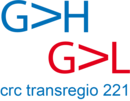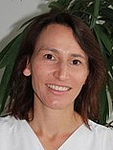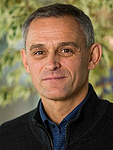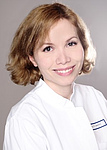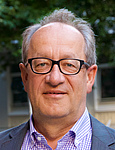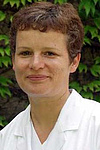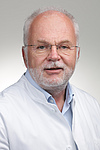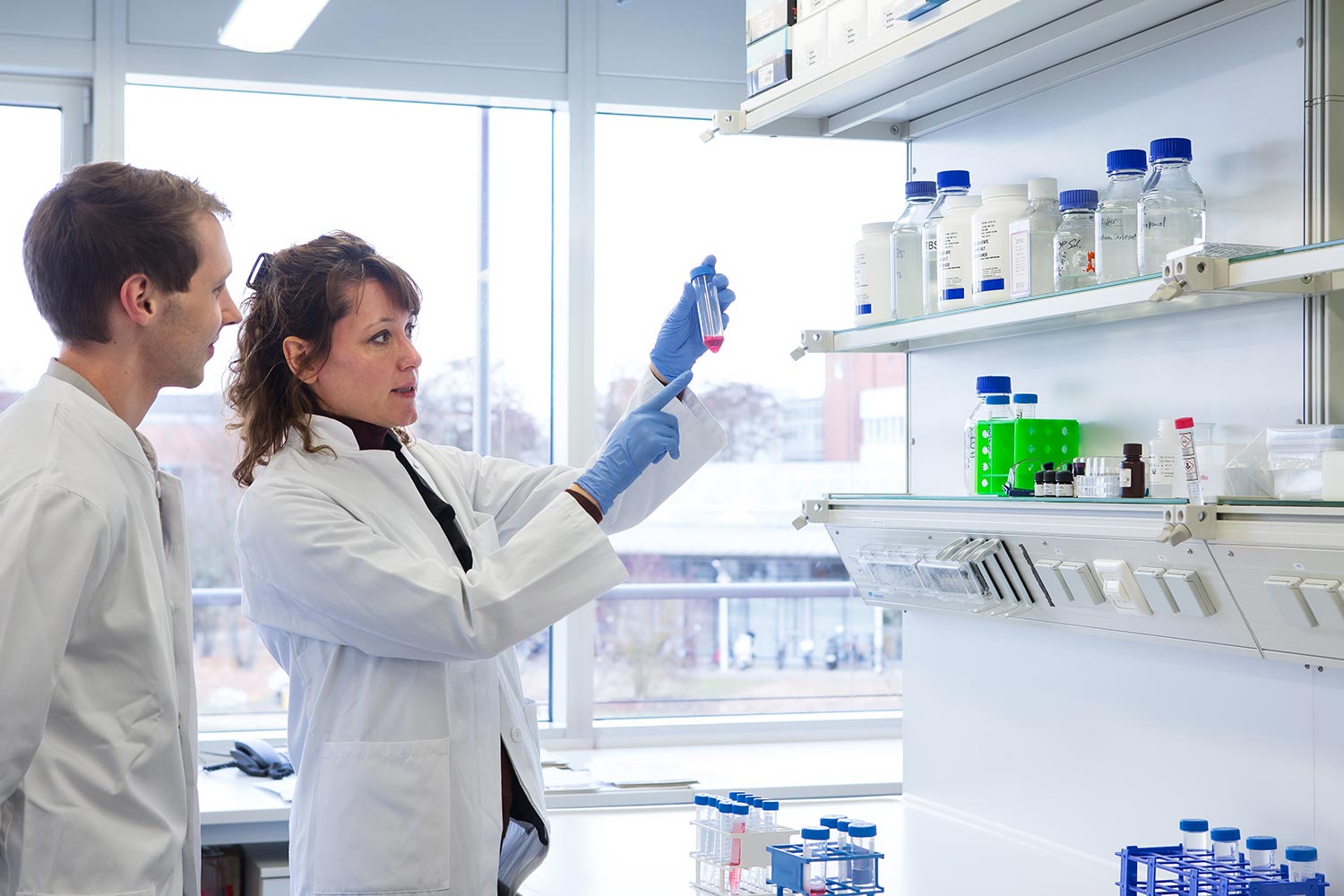
CRC Transregio 221|Projects
Summary Project B01
Calcineurin inhibitors block NFAT activation and protect patients from graft-versus-host disease during bone marrow transplantation. On the other hand, they exert adverse side effects and interfere with the valuable graft-versus-leukemia effect. In contrast, NFAT deficiency maintains graft-versus-leukemia activity, although still protecting from graft-versus-host disease in mouse models. Therefore, it is planned to evaluate new NFAT inhibitors in vitro, on engineered human skin and in mouse models, as well as to ablate NFAT family members by CRISPR/Cas9 ahead of cell transfer.
Selected publications
Bülow, S. et al. (2024) ‘Bactericidal/permeability-increasing protein instructs dendritic cells to elicit Th22 cell response’, Cell Reports, 43(3), p. 113929. Available at: https://doi.org/10.1016/j.celrep.2024.113929.
Xiao, Y. et al. (2021) ‘Lack of NFATc1 SUMOylation prevents autoimmunity and alloreactivity’, Journal of Experimental Medicine, 218(1), p. e20181853. Available at: https://doi.org/10.1084/jem.20181853. Data available in GSE119313
Contact to Principal Investigator
- PD Dr. rer. nat Friederike Berberich-Siebelt
Universität Würzburg
Institut für Pathologie
Josef-Schneider-Straße 2
97080 Würzburg
T: 0931 31-81208
path230(at)mail.uni-wuerzburg.de
- PD Dr. med. Silvia Spörl
University Hospital Erlangen
Department of Medicine 5
Ulmenweg 18
91054 Erlangen
T: +49 9131 8545021
silvia.spoerl(at)uk-erlangen.de
Project B02
Summary Project B02
Previously, we demonstrated in mice that targeting of TNFR2 and Fn14 allows GvL effect-sparing inhibition of GvHD by different mechanisms. Now, we will clarify whether co-targeting of TNFR2 and Fn14 yields additive or even synergistic therapeutic activity. To facilitate clinical translation of TNFR2 targeting on Tregs, we will also develop human TNFR2-specific antibody variants with Fcγ-receptor-independent agonistic activity and various IL-2 receptor targeted TNFR2 agonists. These reagents will be tested and evaluated in a variety of in vitro models but also in knockin mice in which the ectodomain of murine TNFR2 has been replaced by the corresponding domain of human TNFR2.
Selected publications
Lubrano Di Ricco, M. et al. (2020) ‘Tumor necrosis factor receptor family costimulation increases regulatory T‐cell activation and function via NF‐κB’, European Journal of Immunology, 50(7), pp. 972–985. Available at: https://doi.org/10.1002/eji.201948393. Data available in GSE146135
Siegmund, D. and Wajant, H. (2023) ‘TNF and TNF receptors as therapeutic targets for rheumatic diseases and beyond’, Nature Reviews Rheumatology, 19(9), pp. 576–591. Available at: https://doi.org/10.1038/s41584-023-01002-7.
Contact to Principal Investigator
- Prof. Dr. rer. nat. Harald Wajant
University Hospital Würzburg
Department of Medicine II
Molecular Internal Medicine
Röntgenring 11
97070 Würzburg
T: +49 931 201-71000
harald.wajant@mail-uni-wuerzburg.de
Project B03
Summary Project B03
CSF2+ T cells have been recently described to critically mediate immune-mediated tissue-damage in various autoimmune disease models. Their role within the pathogenesis of GvHD has not been studied yet. Our results indicate that CSF2+ donor T cells critically contribute to intestinal GvHD manifestation suggesting that CSF2 might represent a novel drugable target to limit GvHD. Hence, the overall goal of this research project is to molecularly and functionally define the T cell-extrinsic and -intrinsic signals that drive CSF2+ donor T cell formation and identify the characteristics and effector mechanisms of CSF2+ donor T cells in the immune pathogenesis of GvHD.
Selected publications
Buchele, V. et al. (2018) ‘Targeting Inflammatory T Helper Cells via Retinoic Acid-Related Orphan Receptor Gamma t Is Ineffective to Prevent Allo-Response-Driven Colitis’, Frontiers in Immunology, 9, p. 1138. Available at: https://doi.org/10.3389/fimmu.2018.01138.
Hippe, K. et al. (2023) ‘Round-Robin test for the histological diagnosis of acute colonic Graft-versus-Host disease validating established histological criteria and grading systems’, Virchows Archiv, 483(1), pp. 47–58. Available at: https://doi.org/10.1007/s00428-023-03544-3.
Contact to Principal Investigator
- Prof. Dr. med. Kai Hildner
University Hospital Erlangen
Department of Medicine 1
Ulmenweg 18
91054 Erlangen
T: +49 9131 85-35000 o. 85-45173
kai.hildner(at)uk-erlangen.de
Project B04
Summary Project B04
Metabolic deregulation is emerging as a common pathogenic driver of chronic inflammatory as well as fibrosing diseases. We demonstrated in our preliminary resultsthat the expression of ALDH3A2 is deregulated in the skin of cGvHD patients in a TGFb-dependentmanner. Inactivation of ALDH3A2 prevented fibroblast activation, whereas overexpression of ALDH3A2 promoted collagen release and deposition of extracellular matrix. Moreover, inactivation of ALDH3A2 modulated leukocyte infiltration and ameliorated tissue remodelingin the murine cGvHD. With the current project, we aim to study the effects of ALDH3A2 on leukocyteinfiltration and fibroblast activation in experimental cGvHD and to decipher the molecular mechanisms, by which ALDH3A2 regulates inflammation and tissue remodeling in cGvHD.
Selected publications
Treutlein, C. et al. (2023) ‘Assessment of myocardial fibrosis in patients with systemic sclerosis using [68Ga]Ga-FAPI-04-PET-CT’, European Journal of Nuclear Medicine and Molecular Imaging, 50(6), pp. 1629–1635. Available at: https://doi.org/10.1007/s00259-022-06081-4.
Schmidt, A. et al. (2022) ‘Deciphering Pro-angiogenic Transcription Factor Profiles in Hypoxic Human Endothelial Cells by Combined Bioinformatics and in vitro Modeling’, Frontiers in Cardiovascular Medicine, 9, p. 877450. Available at: https://doi.org/10.3389/fcvm.2022.877450. Data available in GSE70335
Contact to Principal Investigators
- Prof. Dr. med. Jörg Distler
University Hospital Erlangen
Department of Medicine 3
Ulmenweg 18
91054 Erlangen
T: +49 9131 85-43008
joerg.distler(at)uk-erlangen.de
- PD Dr. med. Regina Jischin, PhD
University Hospital Erlangen
Department of Medicine 5
Ulmenweg 18
91054 Erlangen
T: +49 9131 8543113
regina.jitschin(at)uk-erlangen.de
Project B07
Summary Project B07
We previously showed that donor CD4+CD25+Foxp3+ regulatory T cells (Treg) prevent lethal acute GvHD after MHC-mismatched BMT in murine models. We now observed that they also ameliorate ongoing GvHD and the prerequisites for efficacious GvHD therapy are studied in this project. For this purpose, the migration pattern of in vitro expanded donor Treg is examined, their organ-specific T cell receptor (TCR) repertoire selection and their site-specific functional status. Finally, we investigate whether their therapeutic efficacy in GvHD can be enhanced by the overexpression of alloreactive TCRs or tissue-specific homing receptors.
Selected publications
Delacher, M. et al. (2024) ‘The effector program of human CD8 T cells supports tissue remodeling’, Journal of Experimental Medicine, 221(2), p. e20230488. Available at: https://doi.org/10.1084/jem.20230488. Data available in GSE223989
Dittmar, D.J. et al. (2024) ‘Donor regulatory T cells rapidly adapt to recipient tissues to control murine acute graft-versus-host disease’, Nature Communications, 15(1), p. 3224. Available at: https://doi.org/10.1038/s41467-024-47575-z. Data available in GSE223800
Contact to Principal Investigators
- PD Dr. rer. nat. Petra Hoffmann
LIT - Leibniz Institute for Immunotherapy (former RCI)
c/o Universitätsklinikum Regensburg
Franz-Josef-Strauß-Allee 11
93053 Regensburg
T: +49 941 944-38492
petra.hoffmann(at)ukr.de
- Prof. Dr. rer. nat. Michael Rehli
University Hospital Regensburg
Department of Internal Medicine III
Franz-Josef-Strauß-Allee 11
93053 Regensburg
T: +49 941 944-38487
michael.rehli(at)ukr.de
- Prof. Dr. med. Matthias Edinger
University Hospital Regensburg
Department of Internal Medicine III
Franz-Josef-Strauß-Allee 11
93053 Regensburg
T: +49 941 944-5582
matthias.edinger(at)ukr.de
Project B08
Summary Project B08
Regulatory T cells (Treg) perform two distinct functions: they maintain self-tolerance and support organ homeostasis by differentiation into specialized tissue Treg cells. We aim to harness the tissue-repair, organ-homeostasis promoting function of tissue-resident Treg cells to prevent or treat graft-versus-host disease after allogeneic bone marrow transplantation. In this respect, we study a TH2-biased tissue Treg population that is present in virtually all organs. We will use loss-of-function and gain-of-function experiments to understand how these cells function during GvHD. Finally, we want to translate these findings into the human context.
Selected publications
Delacher, M. et al. (2024) ‘The effector program of human CD8 T cells supports tissue remodeling’, Journal of Experimental Medicine, 221(2), p. e20230488. Available at: https://doi.org/10.1084/jem.20230488. Data available in GSE223989
Bittner, S., Hehlgans, T. and Feuerer, M. (2023) ‘Engineered Treg cells as putative therapeutics against inflammatory diseases and beyond’, Trends in Immunology, 44(6), pp. 468–483. Available at: https://doi.org/10.1016/j.it.2023.04.005.
Contact to Principal Investigator
- Prof. Dr. med. Markus Feuerer
LIT - Leibniz Institute for Immunotherapy (former RCI)
c/o Universitätsklinikum Regensburg
Franz-Josef-Strauß-Allee 11
93053 Regensburg
T: +49 941 944-38121
markus.feuerer(at)ukr.de
Project B09
Summary Project B09
Based on our recent findings on the spatio-temporal kinetics of graft-versus-host disease (GvHD) pathophysiology we discovered a regulatory myeloid cell population that exerts protective functions during the intestinal GvHD effector phase. Employing preclinical mouse models for GvHD and GvL we will interrogate the identity, mechanism of action, and therapeutic potential of this immune-protective myeloid cell subset to improve allo-HSCT.
Selected publications
Anany, M.A. et al. (2024) ‘Generic design principles for antibody-based tumour necrosis factor (TNF) receptor 2 (TNFR2) agonists with FcγR-independent agonism’, Theranostics, 14(2), pp. 496–509. Available at: https://doi.org/10.7150/thno.84404.
Shaikh, H. et al. (2022) ‘Fibroblastic reticular cells mitigate acute GvHD via MHCII-dependent maintenance of regulatory T cells’, JCI Insight, 7(22), p. e154250. Available at: https://doi.org/10.1172/jci.insight.154250. Data available in GSE168114
Contact to Principal Investigator
Prof. Dr. med. Dr. med. univ. Andreas Beilhack | Dr. rer. nat. Mercedes Gomez de Agüero |
Universitätsklinikum Würzburg | Julius-Maximilians-University Würzburg |
Medizinische Klinik und Poliklinik II | Würzburg Institute für Systemimmunologie |
ZEMM Zentrum für Experimentelle Molekulare Medizin | Versbacher Straße 9 |
Zinklesweg 10 | 97078 Würzburg |
97078 Würzburg | T: +49 931 80303 |
T: 0931 201-44040 | |
|
Project B10
Summary Projects B10
Although experimental data point to a crucial role of antibody mediated damage in chronic GvHD clinical evidence remains restricted to associations but direct proof is lacking. Within the research program we will analyse clonal B cell subpopulations directly involved in clinical chronic GvHD, characterize host specific antibodies including identification of targets and glycosylation profile, analyse T follicular helper cells mediating this process and finally characterize B cell infiltration host-and donor-antibody mediated damage of target organs.
Selected publications
Winkler, J. et al. (2024) ‘Adoptive transfer of donor B lymphocytes: a phase 1/2a study for patients after allogeneic stem cell transplantation’, Blood Advances, 8(10), pp. 2373–2383. Available at: https://doi.org/10.1182/bloodadvances.2023012305.
Ferreira-Gomes, M. et al. (2021) ‘SARS-CoV-2 in severe COVID-19 induces a TGF-β-dominated chronic immune response that does not target itself’, Nature Communications, 12(1), p. 1961. Available at: https://doi.org/10.1038/s41467-021-22210-3. Data available in GSE158038
Contact to Principal Investigators
- Prof. Dr. rer. nat. Thomas Winkler
FAU Erlangen-Nürnberg
Department of Biology
Nikolaus-Fiebiger-Center for Molecular Medicine
Glückstraße 6
91054 Erlangen
T: +49 9131 85-29136
thomas.winkler(at)fau.de
- Dr. med. Julia Winkler
University Hospital Erlangen
Department of Medicine 5
Ulmenweg 18
91054 Erlangen
T: +49 9131 85-43112
julia.winkler(at)uk-erlangen.de
- Prof. Dr. med. Daniel Wolff
University Hospital Regensburg
Department of Internal Medicine III
Franz-Josef-Strauß-Allee 11
93053 Regensburg
T: +49 941 944-5531
daniel.wolff(at)ukr.de
Project B11
Summary Project B11
Patients undergoing allogeneic HSCT have an increased risk of cardiovascular disease. To address the interconnection between GvHD and atherosclerosis, we will use a GvHD-atherosclerosis mouse model and analyze GvHD activity, plaque development, as well as local and systemic immune responses. We will further focus on monocytes/macrophages and CD8+ T cells in mediating vascular inflammation and GvHD using relevant knockout mice and/or cell depletion strategies. In addition, we will investigate the potential of immunosuppressive drugs to improve GvHD-related atherosclerosis. It is our aim to define novel approaches to reduce cardiovascular events after HSCT.
Selected publications
Ullrich, E., Beilhack, A. and Wolf, D. (2022) ‘Editorial: Novel and Improved Methods for the Prevention and Treatment of Graft-Versus-Host Disease (GVHD)’, Frontiers in Immunology, 13, p. 966389. Available at: https://doi.org/10.3389/fimmu.2022.966389.
Vargas, J.G. et al. (2022) ‘A TNFR2-Specific TNF Fusion Protein With Improved In Vivo Activity’, Frontiers in Immunology, 13, p. 888274. Available at: https://doi.org/10.3389/fimmu.2022.888274.
Anany, M.A. et al. (2024) ‘Generic design principles for antibody-based tumour necrosis factor (TNF) receptor 2 (TNFR2) agonists with FcγR-independent agonism’, Theranostics, 14(2), pp. 496–509. Available at: https://doi.org/10.7150/thno.84404.
Contact to Principal Investigators
- Prof. Dr. med. Alma Zernecke-Madsen
University Hospital Würzburg
Department of Experimental Biomedicine II
Josef-Schneider-Straße 2
97080 Würzburg
T: +49 931 201-48331
alma.zernecke(at)uni-wuerzburg.de
- Prof. Dr. med. Dr. med. univ. Andreas Beilhack
University Hospital Würzburg
Department of Medicine II
ZEMM Center for Experimental Molecular Medicine
Zinklesweg 10
97078 Würzburg
T: +49 931 201-44040
beilhack_a(at)ukw.de
Project B12
Summary Project B12
To understand the underlying mechanisms for the protective effects of vitamin D3 in allogeneic HSCT patients we will investigate vitamin D3-related changes in the microbiome, epithelial barrier function and immune cell infiltration in GvHD target tissues in murine GvHD models. In vitro-analyses will prove direct effects of vitamin D3 on the function of T cells and macrophages. Results will be confirmed in murine models after selective deletion of the vitamin D receptor in T cells, macrophages and epithelial cells. Finally, effector mechanisms will be verified in human GvHD samples. Results should provide the basis for vitamin D3 supplementation of allo-HSCT patients in a prospective clinical trial.
Selected publications
Schreiber, L. et al. (2024) ‘Strain specific differences in vitamin D3 response: impact on gut homeostasis’, Frontiers in Immunology, 15, p. 1347835. Available at: https://doi.org/10.3389/fimmu.2024.1347835.
Hammon, K. et al. (2024) ‘D-2-hydroxyglutarate supports a tolerogenic phenotype with lowered major histocompatibility class II expression in non-malignant dendritic cells and acute myeloid leukemia cells’, Haematologica [Preprint]. Available at: https://doi.org/10.3324/haematol.2023.283597.
Contact to Principal Investigators
- Prof. Dr. rer. nat. Marina Kreutz
University Hospital Regensburg
Department of Internal Medicine III
Franz-Josef-Strauß-Allee 11
93053 Regensburg
T: +49 941 944-5577
marina.kreutz(at)ukr.de
- PD Dr. rer. nat Heiko Bruns
University Hospital Erlangen
Department of Medicine 5
Ulmenweg 18
91052 Erlangen
T: +49 9131 85-43163
heiko.bruns(at)uk-erlangen.de
Project B13
Summary Project B13
Based on our previous observation, that high enterococcal abundance associates with GvHD, we aim to analyze the causal relationship between enterococci and GvHD. Enterococcal strains collected from GvHD patients will be tested for pathogenicity in epithelial cell cultures as well as in murine models of colitis and GvHD: GvHD will be induced after recolonization of mice pretreated with antibiotics or of germfree mice with apathogenic and highly pathogenic strains. Full sequencing and targeted mutagenesis of specific enterococcal strains will be performed to identify strain specific pathogenicity factors. Finally, the impact of enterocccci on intestinal Treg and IgA reconstitution will be analyzed.
Selected publications
Thiele Orberg, E. et al. (2024) ‘Bacteria and bacteriophage consortia are associated with protective intestinal metabolites in patients receiving stem cell transplantation’, Nature Cancer, 5(1), pp. 187–208. Available at: https://doi.org/10.1038/s43018-023-00669-x.
Jarosch, S. et al. (2023) ‘Multimodal immune cell phenotyping in GI biopsies reveals microbiome-related T cell modulations in human GvHD’, Cell Reports Medicine, 4(7), p. 101125. Available at: https://doi.org/10.1016/j.xcrm.2023.101125. Data available in GSE234357
Contact to Principal Investigators
- PD Dr. med. Daniela Weber
University Hospital Regensburg
Department of Internal Medicine III
Franz-Josef-Strauß-Allee 11
93053 Regensburg
T: +49 941 944-5510
daniela.weber(at)ukr.de
- Prof. Dr. med. Dr. rer. nat. André Gessner
University Hospital Regensburg
Department of Clinical Chemistry and Laboratory Medicine
Franz-Josef-Strauß-Allee 11
93053 Regensburg
T: +49 941 944-6401
andre.gessner(at)ukr.de
- Prof. Dr. med. Ernst Holler
University Hospital Regensburg
Department of Internal Medicine III
Franz-Josef-Strauß-Allee 11
93053 Regensburg
T: +49 941 944-5542
ernst.holler(at)ukr.de
